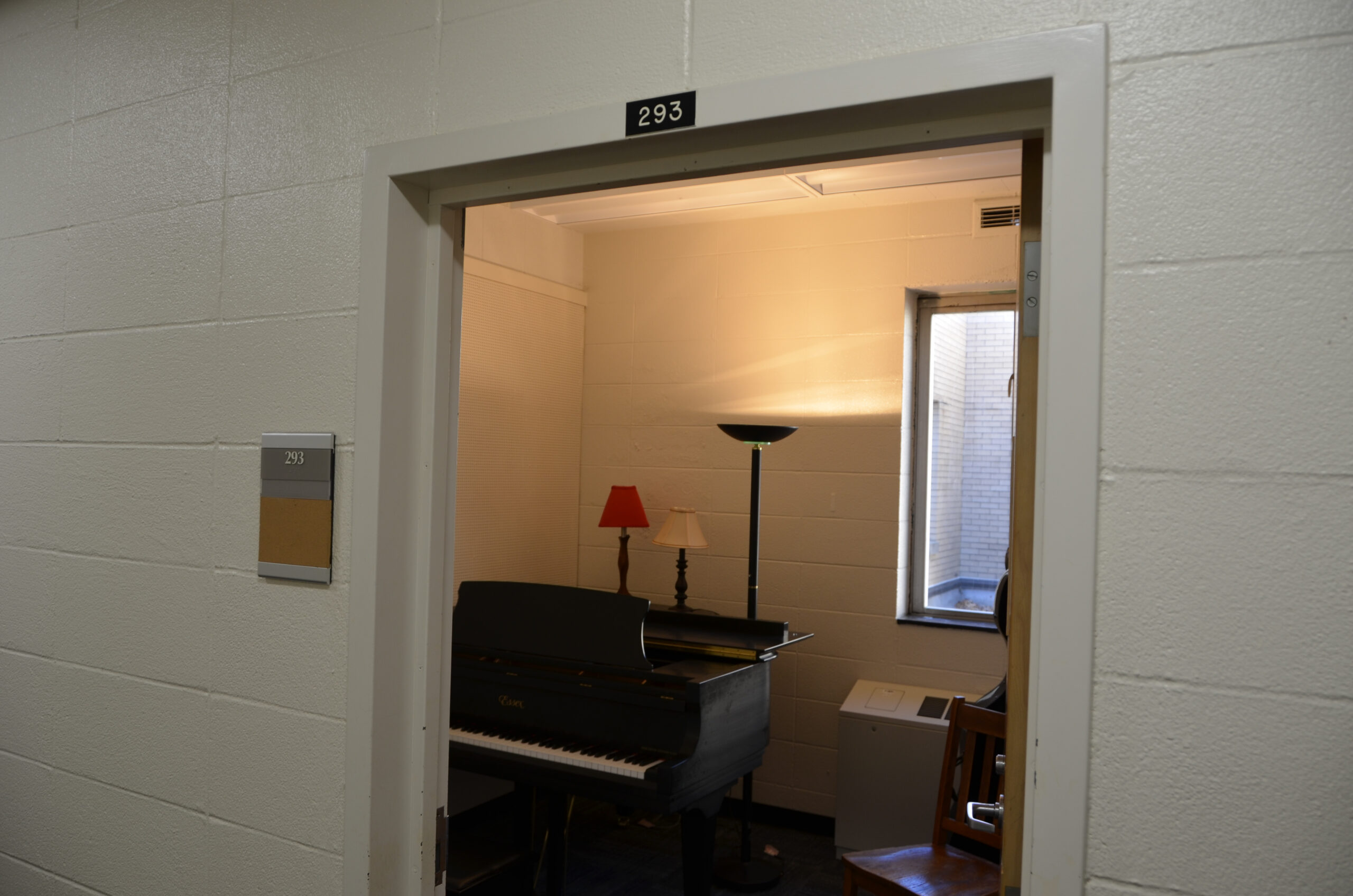The new practice rooms are located in Lilly Hall 255 and 293. Photo by Jonathan Wang.
ERIKA KOVACH | STAFF REPORTER | ekovach@butler.edu
More than 300 performances a year are organized at Butler University’s Lilly Hall between the various ensembles, studios and orchestras. These performances — along with coursework and perfecting their craft — require many music students to spend much of their time rehearsing in one of the practice rooms located in the building. Earlier this school year, two new rooms—Lilly Hall 255 and 293 — have opened to ease the issue of limited space.
The practice rooms are frequented by many of the students who are regularly in Lilly Hall — including all performance, music education, musical arts and composition majors and minors. Because of this, many students struggle to find open rooms to practice in at times.
David Murray, director of the school of music, explained that these two spaces had previously been practice rooms. However, due to a lack of storage space in the building, one of the rooms was converted into a storage room and the other became a faculty office.
“Ultimately, the decision [to open the rooms] was made by Dean Lisa Brooks and myself in consultation with a few other people in the college,” Murray said. “There were some other room changes that happened over the summer, so it became a bit of a domino effect.”
Junior music education major Brenna White said students in the music school were first told about the changes over the summer when they were notified over email that some of the storage spaces were being consolidated.
“I’m glad we have some new practice rooms,” White said. “It’s nice to have different options when there’s more practice room availability because not all practice rooms are the same. Some are bigger which is good for chamber rehearsals, some have pianos, some have windows [and] some have mirrors.”
Practice rooms in Lilly Hall are also used as instructional spaces by more than 100 Butler students annually who teach private lessons as a part of the Butler Community Arts School (BCAS). Murray said rooms designated for teaching typically have posted signs and are occupied in the late afternoon, evening and weekends.
While rooms for BCAS are typically reserved, the remaining practice spaces are first-come, first-serve. Murray said that during the COVID-19 pandemic, the school tried to implement a reservation system for health reasons, but it ended up being ineffective.
“The addition of these two rooms makes availability slightly better,” Murray said. “Not much can be improved because we don’t have space to add any more practice rooms. Until that can happen, there will be times when students have to get creative.”
To help combat the issue of available practice rooms, Murray said that some faculty members have begun opening their studios when they are not in use so students can use them to practice.
“When I was a student and had this problem, I would find a corner somewhere, go outside in nice weather or practice in a bathroom or stairwell,” Murray said. “Not ideal, but I got some work done.”
Many students have also expressed struggles with soundproofing and space in the building.
Junior violin performance major Evan McFall said that because there is only so much space in the Lilly Hall for the practice rooms, musicians are often close to one another.
“[The rooms] are pretty small and not very soundproof,” McFall said. “So if there’s a drummer or something down the hall and they’re bashing away, you can’t really hear yourself … just [because] there’s not a whole lot of space.”
McFall said he thinks the building is a good space for musicians — it simply becomes difficult to share limited facilities between various groups such as BCAS, the Indianapolis Children’s Choir and the Indianapolis Youth Orchestra.
“I know the School of Music is small compared to the rest of the university, but it’s been growing,” McFall said. “It’s getting a little overcrowded. Butler’s doing a good job of giving these organizations a space to rehearse. It’s great because kids around Indianapolis are able to find a place to come and do that, but people who pay a lot of money to come here aren’t always getting to take full advantage of the facility.”
Despite some issues, many students at Lilly are happy to share the space — perhaps with a more equal division of time — especially as many of them participate in and receive compensation from programs like BCAS as instructors. White and McFall said the new rooms provide a nice change of scenery, and show attempts to make changes where possible in the Jordan School of Music.



